Dental Implants — Fort Worth, TX
Rebuild Your Smile with Dental Implants
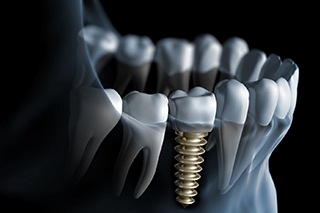
Why Choose David Tillman D.D.S. for Dental Implants?
- Performs Placement and Restoration Phases In-House
- Advanced Technology in Modern Dental Office
- Multiple In-Network Insurance Plans and Affordable Financing
What Are Dental Implants?

Dental implants are replacements for missing teeth. They mimic the form and function of a tooth so closely that you probably won’t be able to tell the difference between them and your natural teeth. A single dental implant is most often made of a titanium post that is embedded in your jawbone. Then, an abutment connects the implant to your tooth restoration, which could be a crown, bridge or denture. After the implant has fully healed, you can expect eating your favorite foods, practicing oral care, and basic tasks like smiling and speaking to feel incredibly natural. These are just a few of the reasons why Dr. Tillman and most dentists around the world recommend them over other solutions.
The 4-Step Dental Implant Process

If dental implants are the best option for you, we would be happy to discuss your next steps. Treatment with dental implants is completed in four steps. Besides earning his dental degree, Dr. Tillman has undergone 3 additional years of training in implant dentistry and bone grafting to handle each step in your treatment plan right here in our office. You’ll save time and money with complete care under one roof. Read on to learn more about the process so you know what to expect.
Initial Dental Implant Consultation

The first step in the dental implant process is seeing Dr. Tillman for your consultation. During this time, he will examine your smile to determine if you are a good candidate for the procedure. Some patients need preliminary procedures, like bone grafting or gum disease treatment, before they are able to get dental implants. If this applies to you, we will help you get them scheduled. Once your gums and jaw are in good health, we can move forward in planning the rest of your treatment.
Dental Implant Surgery
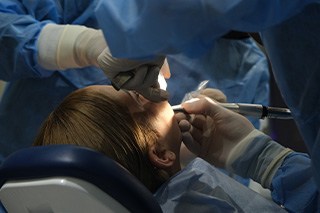
Getting dental implants requires a surgical procedure. Dr. Tillman is highly trained in implant dentistry and performs the procedure in-house, so you don’t need to worry about working with a specialist at a different location. After numbing the area with a local anesthetic, an incision is made in the gum tissue so the dental implants can be placed are precise locations and angles in the jawbone. The gums are then closed, and protective caps are placed on the ends of them to keep them safe during the healing process.
Dental Implant Osseointegration & Abutment
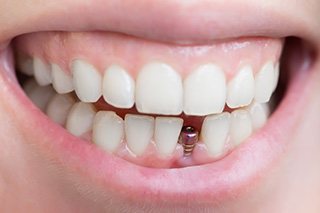
Over the next three to six months, the dental implants and jawbone will fuse together in a process called “osseointegration.” This is what makes the replacement teeth so stable and long-lasting. Once the area has healed, you will need to undergo another minor procedure in which connected pieces, called abutments, are placed on the ends of the dental implants. Impressions are taken and sent to the dental lab so your custom restoration can be made.
Delivery of Dental Implant Restoration

Once we receive your custom-crafted restoration from the dental lab, you will need to return to our practice. Dr. Tillman will secure your replacement teeth to your dental implants. If everything looks and feels great, you will be free to show off your new, complete smile to the world!
Benefits of Dental Implants

Day-to-Day Benefits

- Looks natural using all-ceramic material: The restorations we use to cover your dental implants are color-matched to your existing teeth to ensure they blend in exactly. This is the case whether you’re receiving a single crown, bridge, or denture to replace your teeth.
- Supports facial tissues: Tooth loss does not only affect the appearance of your smile. It can also impact your overall facial appearance. Once dental implants are placed, blood flow to the gums increases. This reduces facial sagging and hollowing of the cheeks, two common side effects of tooth loss.
- Easy at-home maintenance: Brushing and flossing your dental implants feels almost indistinguishable from cleaning your natural teeth. By maintaining consistent oral care at home, you can keep plaque from collecting on your implant restorations or the gum tissue surrounding your replacement tooth.
Health Benefits

- Regain as much as 70% of your natural biting force: Dentures may be able to replace many teeth at a time, but they won’t do many favors for your biting force. As dental implants stimulate your jawbone tissue, chewing your favorite foods feels natural again.
- Preserves your jawbone’s density: Jawbone tissue will begin to atrophy when teeth are lost. This means they will shrink and break down. Once the implant has healed and fused with your bone tissue, you can expect your jawbone to retain its shape. This is why we often recommend dental implant surgery relatively soon after teeth are extracted.
- Prevent dental drift: After teeth are lost, remaining teeth will begin to shift into the open space in order to compensate. This side effect can cause the teeth to become dramatically misaligned over time. Dental implants keep any remaining teeth from moving and keep your smile straight and your bite even.
Long-Term Benefits

- Over a 95% success rate: When you want a reliable solution to severe tooth loss, you won’t find any treatment better than dental implants. With such a high success rate, you can have confidence knowing your tooth replacement will serve you well.
- Cost-effective: Other tooth replacement options, including dental bridges and dentures, don’t carry the same longevity as dental implants. It’s true that dental implants cost more upfront, but this can save you money on replacement restorations (bridges require replacement every 10 to 15 years, while dentures need replacement every 5 to 7 years).
- Provides decades of function: Dental implants generally last 30 years and longer, which means they can potentially last for the rest of your life when you take proper care of them.
Who Dental Implants Can Help

Implants are incredibly versatile. They can be paired with a single crown, a bridge, a partial, or a full denture. No matter how many teeth you need to replace, dental implants can help.
Who Is a Good Candidate for Dental Implants?

For the most part, just about all of the patients we see turn out to qualify for dental implants. However, there are a few guidelines. First, you must be in overall good health because receiving dental implants does require oral surgery. In addition, wanting dental implants is another good reason not to be a smoker. Tobacco use can impede the healing process after surgery. Finally, you’ll need to have enough bone volume in your jaw to support the dental implant. Dr. Tillman will check this during your pre-exam.
Missing One Tooth
An implant post, an abutment, and a custom-made crown replace the entire structure of a missing tooth. It will blend in seamlessly with your teeth, so no one will know it isn’t your own.
Missing Multiple Teeth
A bridge of prosthetic teeth is created to fill the empty space. It’s held in place using a dental implant at either end, so there’s no need to alter healthy teeth.
Missing All Teeth
An average of 4 to 8 implant posts secure your denture to your jawbone. You’ll never need to worry about any slipping or irritation again!
Understanding the Cost of Dental Implants

If you’re dealing with tooth loss, then Dr. Tillman may have already talked to you about the advantages of dental implants. Now there is just one more question: What is the cost of dental implants in Fort Worth?
On average, a single dental implant will cost between $1500 and $2000. But don’t base your decision on the price tag only. There are other factors to consider.
Preliminary Treatments & Dental Implant Surgery
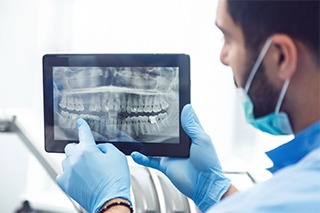
Sometimes, preparatory dental work is needed before implants can be placed in your jaw. For example, you may have some teeth that need extraction. Also, bone and tissue graft surgeries may be required to strengthen your gums and jawbone so they are sturdy enough to hold dental implants in place. The fee for these procedures affects the total cost of your dental implants.
The Cost of a Tooth Restoration
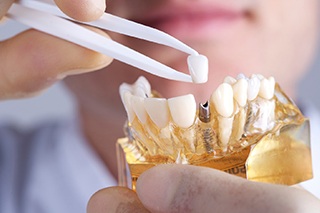
Additionally, the total cost of dental implants depends on the type of restoration you need. If you need to replace one missing tooth, a single dental crown typically runs between $500 and $1500. To replace several teeth in a row, a bridge costs between $3000 and $4000. And partial and full dentures are $2500 to $5000 or more.
How Dental Implants Can Save You Money

People that wear dentures or a bridge will eventually need to repair and replace these removable prosthetics. That’s because they rest on your gum ridge, which changes shape over the years. Dental implants, on the other hand, can last for decades. In fact, you can have a dental implant for the rest of your life if you brush and floss daily and attend regularly scheduled dental checkups every six months with your dentist in Fort Worth. Hence, the cost of dental implants could be less in the long run when compared to other types of prosthetics that require continual maintenance and eventual replacement.
Does My Dental Insurance Cover Dental Implants?

If you have dental insurance, be sure to check the details of your benefits plan. There may be partial coverage for these types of procedures.
Dental Implant FAQs
Are Dental Implants Safe?
For most patients who have good dental health, dental implants are very successful when placed by a qualified professional. If you have low jawbone density or gum disease, these issues will need to be addressed with preliminary treatments ahead of time to make your dental implant surgery safer and more successful. If you have diabetes, cancer, or other medical conditions that could make surgery or healing risky, we will discuss them with you during your consultation to make a final decision.
How Long Does It Take to Recover from Dental Implant Surgery?
Most patients are able to resume their normal activities the day after surgery. You should avoid strenuous exercise for the first week or so, as it could delay healing. Bleeding should cease after the first couple of days, and swelling should stop after three to four days. Remember to take all prescribed and over-the-counter pain relievers as directed. It could take up to six months for your implants to fuse with your jawbone.
Will People Be Able to Tell That I Have Dental Implants?
Your dental implants will be placed and your restorations designed based on impressions taken of your mouth. Once the restorations are placed, no one should be able to differentiate them from natural teeth. Dental implants are placed in the jaw just like tooth roots, so you won’t need to hold your jaw in an unnatural way to keep them in place like you might have to with poor-fitting dentures. Ultimately, you can expect your restored smile to appear perfectly natural!
How Soon After a Tooth Extraction Can I Get Dental Implants?
In some situations, if the jawbone is healthy enough, a dental implant can be placed immediately after a tooth extraction. Oftentimes, a dentist will recommend waiting three to six months for the mouth to heal. Waiting much longer than this can cause the jawbone to shrink because of the lack of stimulation from the tooth’s roots. The answer will depend on the specifics of your unique case, so we will discuss this in more detail with you.
